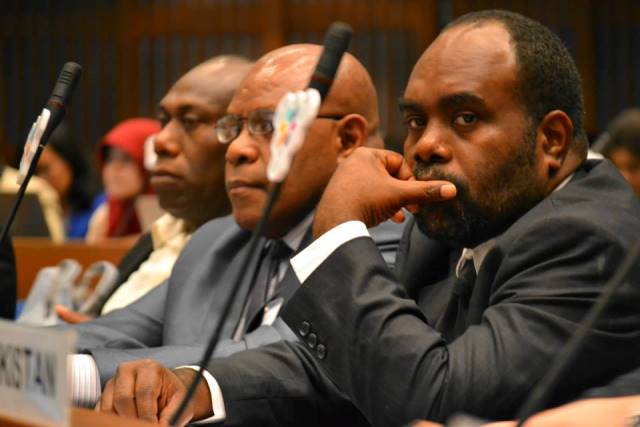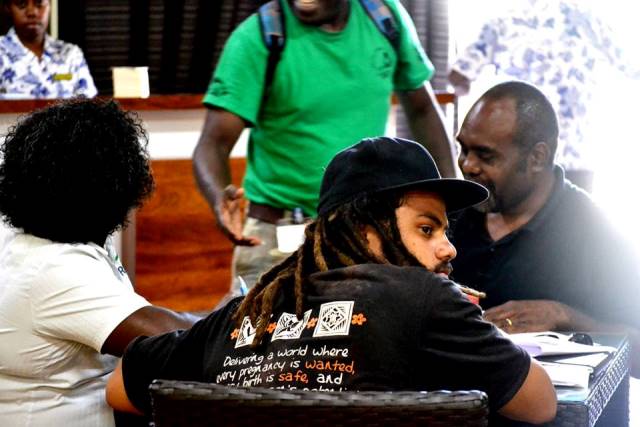When Joe Kalo was the Vanuatu country officer for a United Nations Population Fund Adolescent Reproductive Health project 10 years ago, he had to learn advocacy on his feet - and as we celebrate International Youth Day today, Kalo's mind is on the next sitting of the Vanuatu Parliament.
Kalo is already feeling the birth pangs of a career-related dream that has been nurtured through consistent and patient engagement with stakeholders involve, key of which have been the different various governments that has come into power since Vanuatu's Independence in 1980, and non-government organizations.

Vanuatu youth will celebrate among other things the fact that a much-anticipated enactment of a bill is scheduled in the next Parliamentary sitting, which will significantly change the status of the Vanuatu National Youth Council: it will now be a statutory body, six years after it was established.
For the youth and people of Vanuatu, it has been a long journey from a youth desk in the office of the country's first Prime Minister after independence, Father Walter Lini. Youth development has been housed by various ministries but in 2014, it became a ministry on its own; Vanuatu is also one of the five Pacific island countries that has a youth policy.
Coincidently, the first youth officer who sat in Father Walter Lini's office is now the Head of State, His Excellency Father Baldwin Lonsbale. Father Lonsbale accepted an invitation without hesitation from the Vanuatu National Youth Council to mark the International Youth Day at Torba Province, with the Minister for Justice, Dunstant Hilton and Minister for Agriculture, Christophe Emele - all sons of Torba Province.
State support will now see a youth council upgrade to statutory body and Kalo attributed it to several things including a youth policy, a youth cohort that went from "what is in it for me" to "there is something for all of us in this" and a history of activism and engagement.
For Pacific island nations, a decade can be a long time but as Kalo aptly put it in the Bislama language: no play play, lo work!
"We were serious about what we wanted and how we were going to get it done, we meant business. I pinch myself still because of the potential being a statutory body implies for youth in my country. This has been a truly long journey wrought with a lot of challenges but we are heading in the right direction and I have so much hope for where we can go with such support," Kalo said.
Kalo attributes his advocacy skills to his early days with the UNFPA Pacific Sub-Regional Office-funded project which strengthened his capacity in negotiating high-level advocacy space and his knowledge of such processes.
"It was UNFPA that taught me a lot about advocacy at that level and I've always been grateful to UNFPA for that. Since working with the youth council, UNFPA has also always been very supportive and so I while things can take a long time, investing in us as young people do pay off."
Kalo has the supportive network of eight provincial councils, of six provinces and two municipal-based ones in Port Vila and Luganville. In 2012, Kalo took the International Youth Day celebrations out to the provinces and this calculated risk may well be the key to a sustainable celebration of youth day in Vanuatu as a healthy competition has now developed between youth councils to host the International Youth Day.
Kalo who worked with a teacher at the Ministry for Education wrote the existing family life curriculum for Vanuatu underlines the importance of a holistic approach when dealing with issues relating to youth development.
While he was restricted to certain fields in the various ministries that has housed youth work in Vanuatu over the years, Kalo says working from the youth council allowed the multi-faceted approach youth issues demanded; the key, he said, was streamlining them into a coherent pathway.
"Having state support in terms of policies and legislations are very important but without young people who are determined to see things through then these tools are useless and so it really has been driven by young people," Kalo said.
"Young people must have a say in development plans pertaining to them, it is natural and logical."
International Youth Day is commemorated by member states of the United Nations (UN) every August 12, since it was endorsed by the UN General Assembly in December 1999, on the recommendation of the World Conference of Ministers Responsible for Youth in August 1998; the 2015 International Youth Day theme is Youth Civic Engagement.
"Vanuatu's youth council's journey is an incredible manifestation of the results of engagement and participation of youth in achieving sustainable human development, it doesn't only make sense but it is their basic human right," Dr Laurent Zessler, UNFPA Pacific Director and Representative said.
"For Pacific island nations we work with, youth policies and monographs are two of the forms of support we provide and both requires the meaningful engagement of young people because they know what they will need."
The 2015 Youth Day is right on the heels of the endorsement of the final draft of what will be the post-2015 global 17 sustainable development goals, provisions of which make specific reference to "youth" and the "demographic dividend".
Paragraph 23 of the document begins with "People who are vulnerable must be empowered," specifying nine groups, including youth. In Paragraph 25, member states commit to ensuring that "all people" should be able to access life-long learning opportunities to ensure knowledgeable and skilled civic engagement adding "we will strive to provide children and youth with a nurturing environment for the full realization of their rights and capabilities, helping our countries to reap the demographic dividend including through safe schools and cohesive communities and families.
Together, we can ensure that the post-2015 development agenda promotes the human rights, health and well-being of the largest generation of young people in history. Together, working in partnership with young people, we can enable them to survive, thrive and transform our world, and deliver a better future for all of us.


